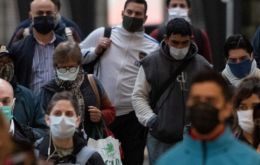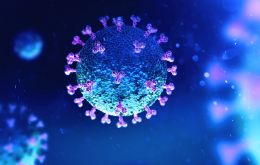MercoPress. South Atlantic News Agency
Tag: COVID-19
-
Thursday, November 20th 2025 - 08:48 UTC
Argentine province back to pandemic-era measures as Covid-19 resurges

The Argentine province of Formosa has confirmed a significant resurgence of Covid-19, prompting health officials to re-establish preventative measures associated with the pandemic and leading to an urgent plea to the National Government over delayed vaccine deliveries.
-
Thursday, October 2nd 2025 - 10:03 UTC
Brazilian health experts underscore benefits of Covid-19 vax for pregnant women

Brazilian health experts echoed this week the findings of a study presented at the American Academy of Pediatrics Congress. Led by researcher Nikan Zargarzadeh of Harvard University and Boston Children's Hospital in the United States, the study analyzed more than 200 primary studies between 2021 and 2023, gathering data from approximately 1.2 million pregnant women.
-
Tuesday, September 2nd 2025 - 19:38 UTC
Brazilian health officials urge people to update Covid-19 vaccination

According to the latest InfoGripe Bulletin from the Rio de Janeiro-based Oswaldo Cruz Foundation (Fiocruz), there has been an increase in cases of severe acute respiratory syndrome (SARS) due to Covid-19 in four Brazilian states: Rio de Janeiro, Ceará, Amazonas, and Paraíba. While the overall number of severe cases remains low and is not yet significantly impacting hospitalizations, health officials are urging people to keep their vaccinations up to date.
-
Thursday, August 21st 2025 - 20:02 UTC
New Covid-19 variants detected in Uruguay

Uruguay's Ministry of Public Health (MSP) has confirmed the circulation in the country of the new Covid-19 “Frankenstein” (XFG) and “Nimbus” (NB.1.8.1) variants. The discovery was made through the country's genomic surveillance system after analyzing samples from sentinel centers.
-
Wednesday, August 6th 2025 - 10:02 UTC
Covid-19: Frankenstein variant detected in Argentina

The XFG variant of Covid-19, nicknamed “Frankenstein” because it is a recombination of two Omicron lineages, has been detected in Argentina, according to the latest edition of the Health Ministry's weekly National Epidemiological Bulletin (BEN), which cited cases from late June and early July, identified through genomic surveillance
-
Monday, July 28th 2025 - 19:28 UTC
Honduras: Teleworking and mask mandates extended

Honduras has extended teleworking for public institutions and virtual classes until Aug. due to a surge in respiratory illnesses, including the detection of highly contagious Omicron XFG Covid-19 variants. The government has also made mask-wearing mandatory in various enclosed public spaces such as hospitals, airports, shopping centers, and public transport.
-
Friday, July 25th 2025 - 19:52 UTC
Honduras decrees contingency measures as Covid-19 cases soar

Honduras is re-implementing several public health measures as cases of Covid-19 have been reported to be on the surge. The Omicron subvariant XFG - also known as Stratus or Frankenstein - is believed to account for 36% of recent infections.
-
Saturday, July 19th 2025 - 10:51 UTC
New Covid-19 variant detected in Brazil

A new Covid-19 variant, Stratus (XFG or XFG.3), also known as “Frankenstein” due to its recombinant nature, has been identified in Brazil and is under international surveillance by the World Health Organization (WHO).
-
Tuesday, July 1st 2025 - 10:32 UTC
Brazilian State of Goiás declares SARS emergency

The Brazilian State of Goiás declared Monday a state of emergency due to Severe Acute Respiratory Syndrome (SARS) after the incidence rate pierced the expected cap for seven weeks in a row, with 6,743 cases of SARS, including 1,117 cases of influenza, 306 of Covid-19, 1,486 of respiratory syncytial virus, and 680 of rhinovirus.
-
Thursday, June 26th 2025 - 10:27 UTC
Measles is “more terrible” than Covid-19, says Bolivian president

Bolivian President Luis Arce Catacora insisted Wednesday that measles was a more severe threat than Covid-19, urging parents to vaccinate children under 5 against the highly contagious viral disease, of which 60 cases have been confirmed nationwide, prompting an emergency declaration.
